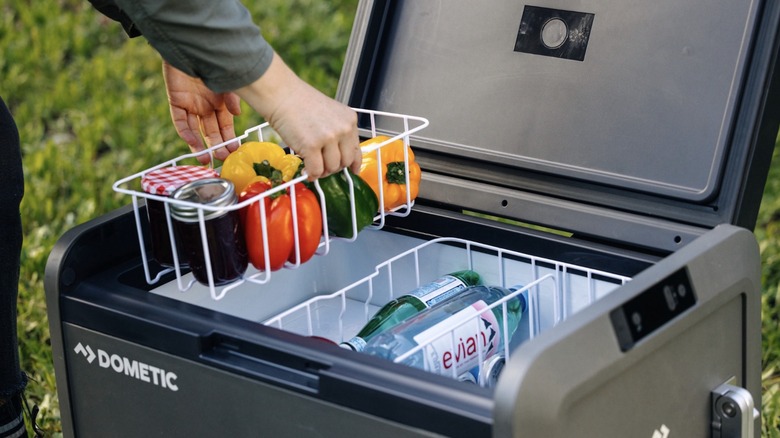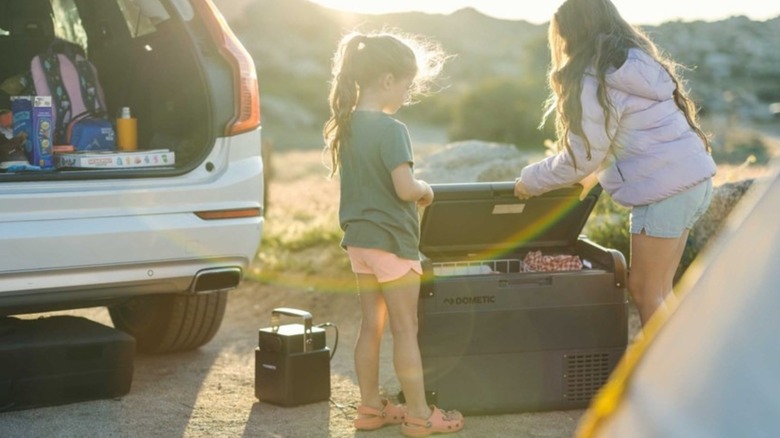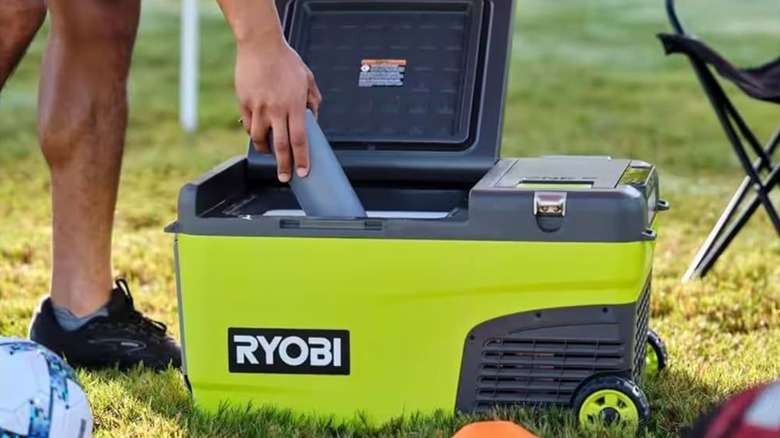Is Switching To An Electric Cooler Worth It? Here's What Users Say
We may receive a commission on purchases made from links.
Traditionally, when you wanted to keep drinks and snacks, like sandwiches and fruit, cold and fresh while spending time outdoors, you'd put them in an insulated cooler packed with ice. This time-tested method has been used for backyard barbecues, hanging out by the pool, and vacation trips to the beach or campsite, as well as at outdoor job sites where workers are toiling in the hot sun. However, as advancing technology makes electric coolers more efficient and affordable, many people are now opting for a powered solution over traditional ice coolers.
Electric coolers that use compressors, such as Makita's and Ryobi's, are essentially portable mini-refrigerators that can run without needing to be plugged in. Like traditional refrigerators, they cycle refrigerants to remove the heat from the interior and dissipate it beyond the exterior, allowing you to set specific temperatures, including down to below-freezing. They're more effective than thermoelectric options, which simply move warmer air out of the back and into a heat sink. These types are at the mercy of ambient temperatures and cannot run continuously.
Electric coolers running on compressors, however, can run indefinitely (if you're willing to continuously swap and recharge batteries or own a hybrid model that can be plugged in). In theory, this should make them a great choice for off-the-grid activities — just one of the potential benefits of using a smart cooler. But do they actually live up to the hype, or are they more trouble than they're worth? Here's a closer look at what people who've tried using electric coolers have to say.
Users praise compressor coolers and detest thermoelectric ones
It's not hard to find opinions on electric coolers because there are multiple camping enthusiasts and other potential users who will ask online whether or not they're a better option than a traditional cooler. One thing you'll notice among feedback from users who say electric coolers are indeed worth upgrading to is that they will make clear that they are talking about compressor-type options, as opposed to thermoelectric. Generally, users express positive feelings toward compressor coolers and disdain for thermoelectric models across multiple online discussions about both coolers and mini-fridges.
Running on battery power is convenient but clearly limited. However, there are several hybrid power options available that include plug-in AC, batteries, and solar — such as the Dometic CFX3. Dometic is a popular brand for electric coolers, and users appreciate the versatile power options as well as the durability of the device, which needs to withstand outdoor environments and constant travel. One Amazon customer describes it as "built like a tank" and adds that it offers "low power consumption for excellent cooling" when using either AC or DC power. Another user reports that Dometic's cooler "is rugged and takes the pitching and rolling of the truck with no issues ... Overall I couldn't be happier with my purchase."
Makita also makes a hybrid-powered electric cooler/warmer that one redditor calls "a really cool cooler." They helpfully add that "during the cooler seasons two 6 Ah batteries will last a couple 8-hr days," but that the same batteries won't last nearly as long on hot summer days and notes "if you plug it into the wall it'll work forever and get colder faster."
The downsides to electric coolers, according to users
Many users find thermoelectric coolers to be relatively useless for keeping perishables cool for extended periods of time, let alone below freezing. But even compressor coolers aren't perfect, according to some users. On r/VanDwellers, one astute redditor warns that compressor models need to be on a flat surface to work properly. According to them, when situated unevenly, "coolant does not circulate properly when on even a slight incline."
This is an issue because the point of coolant is to transfer heat away from the contents of coolers and fridges. The user reports that using their electric fridge "has been a problem for me several times as I live in a very hilly area." The same physics causing trouble for the user also apply to coolers, so if you upgrade to a compressor model, make sure you know you'll have a flat surface to place it on while using it. Other downsides to an electric cooler compared to a traditional cooler, according to users, concern capacity. Because electric coolers have a compressor and electronics taking up space, they hold less inside than a traditional one with the same dimensions would.
For example, users generally like the Ryobi Smart Cooler, but one user who left a 3-star review on Home Depot and otherwise appreciates what Ryobi's electric cooler can do explains that "It's a lot smaller than I expected. The cooling compartment is only half the size of the cooler because the other half holds the batteries." Another drawback to electric coolers is cost. A mixed customer review for Ryobi's model says it "looks great, nice product, but I do consider it too expensive," even before including the cost of Ryobi 18V batteries needed to power it.


